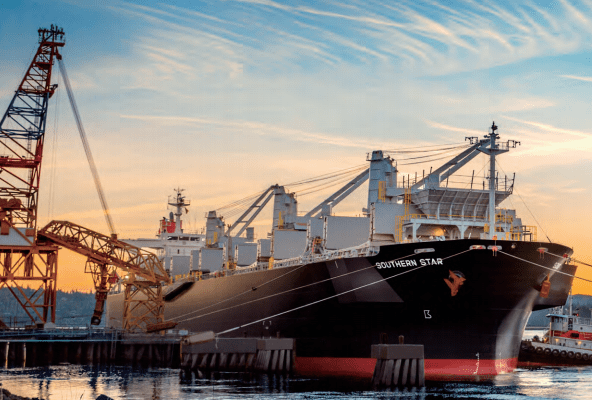Maritime transport: 6 actions for a post-Covid-19 world

In maritime transport, the United Nations Conference for Trade and Development (UNCTAD) outlined policy actions to prepare for a post-pandemic world.
As part of its annual report on maritime transport, it identified six priority areas for policy action in response to the Covid-19 pandemic and the persistent challenges facing the developing country sector and trade.
First action
Support maritime trade so that it can effectively sustain growth and development. Trade tensions, protectionism, restrictions on exports, especially of basic necessities in times of crisis, bring with them economic and social costs. These should be avoided, as far as possible.
In addition, non-tariff measures and other barriers to trade must be addressed, including by intensifying trade facilitation measures and customs automation.
Second action
Help reshape globalization for sustainability and resilience. The disruptions caused by the Covid-19 outbreak have reignited the debate about the risks associated with international manufacturing production and extended supply chains.
It will be important to carefully evaluate the various options when it comes to changes to supply chain design and outcomes that are aligned with the Sustainable Development Goals and the 2030 Agenda for Sustainable Development.
For example, shortening supply chains through relocation or close shoring can reduce shipping costs and fuel consumption, but does not necessarily prepare supply chains for the future for the disruptions that could occur, regardless of location.
Multi-source approaches can ensure greater resilience than approaches that concentrate production in one location, whether at home or abroad.
The debate on globalization should focus on identifying ways in which unsustainable globalization patterns could be mitigated to generate more value for a broader range of economies.
Third action
Promote greater adoption of technology and digitization. Policies must support a digital transformation that improves the resilience of supply chains and their supporting transportation networks.

For shipping to play its role in linking global economies and supply chains, it must take advantage of the crisis by investing in technology and adopting solutions that meet the needs of future supply chains and support resilience efforts.
Digitization efforts should enable greater efficiency, including energy efficiency and productivity in transportation (eg smart ports and shipping).
It should also help countries harness the capabilities of e-commerce and the benefits of maritime transport facilitation that drive trade. To achieve greater impact, cybersecurity must be strengthened at all levels.
Fourth action
Leverage data for policy responses and monitoring. Using rapidly evolving data capabilities can support efforts to forecast growth and monitor recovery trends.
New data sources and improved possibilities emanating from digitization provide ample opportunities to analyze and improve policy.
The pandemic has highlighted the potential of real-time data on ship movement and port traffic, as well as information on shipping schedules to generate early warning systems for economic growth and maritime trade.
Fifth action
Enable agile and resilient shipping systems. There is a need to invest in risk management and preparedness for emergency response beyond pandemics.
Preparing the maritime supply chain and risk management for the future requires greater visibility of door-to-door transportation operations.
For this, it is necessary to formulate plans that establish the key actions and protocols that will be implemented in response to crises, while ensuring business continuity.
Special consideration is needed to address the concerns of seafarers, most of whom come from developing countries.
Collaboration between port states and between different actors within countries continues to be key to improving crew change processes and ensuring standardized procedures and risk management protocols.
Sixth action
Maintain the momentum for sustainability, adaptation to climate change and building resilience.
Current efforts to address carbon emissions from shipping and the ongoing energy transition away from fossil fuels must remain a priority.
Governments could direct stimulus packages to support recovery while promoting other priorities such as climate change mitigation and adaptation action.
Therefore, policies adopted in the context of a post-pandemic world should support further progress in the shipping industry‘s transition to the green economy and sustainability.
Meanwhile, concerns about sustainability and resilience, such as connectivity between small island developing States and adaptation to climate change, remain key priorities.

In these states, critical coastal shipping infrastructure is a lifeline for foreign trade, tourism, and food and energy security.
The generation and dissemination of personalized data and information plays an important role in risk assessment, improvement of levels of connectivity, development of effective adaptation measures, preparation of specific studies, and multidisciplinary and multi-stakeholder collaboration.
In addition, progress towards achieving Sustainable Development Goals target 8.1 (sustainable economic growth in least developed countries) is increasingly important to strengthen the resilience of least developed countries and their ability to cope with future shocks. .
Marine transport
The Covid-19 pandemic is a litmus test, not only for globalization but also for global solidarity and collaboration.
The success of the aforementioned policy measures will depend on effective international collaboration to ensure coordinated policy responses.
Coordinated efforts are also needed to standardize data, monitor port performance, and develop protection mechanisms against cybercrime.
In tackling the challenges ahead, policymakers must ensure that financial support, technical cooperation and capacity building are provided to developing countries, particularly the most vulnerable groups of countries, including least developed countries. , landlocked developing countries and small island developing States.
![]()

